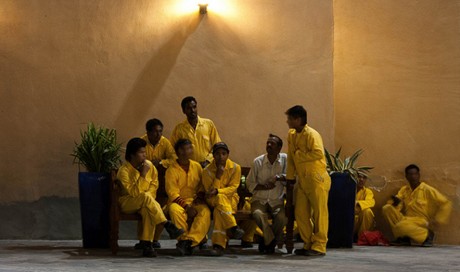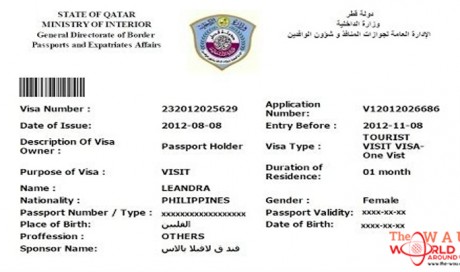The much awaited new labour law was implemented throughout Qatar on 13th of this month. "Qatar remains thoroughly committed to the establishment of a labour system, which is fair everyone; both the employer as well as the employee. The legislative changes are an ongoing effort to systematically reform the labour system across the spectrum such that workers' rights are protected. The Government will continue to review and adapt the laws of the country in order meet the requirements of the reform", the Government Communications Office said in a statement.
In order to create awareness among lesser educated workers about the new labour law, the Ministry of Administrative Development, Labour and Social Affairs (MADLSA), in collaboration with the Ministry of Communications and Transport has installed kiosks at many labour camps with a motive to educate the workers about their rights as specified by the new labour law.
The kiosks come with pre-recorded video clips in as many as ten languages that explain to the workers how the new law protects their rights in Qatar. Workers can also learn about complaint filing from the kiosks. As many as 11 automated machines have been installed in the public services complexes across the country, which can be used by the workers to submit work related complaints without any hassles.
A report titled 'New Name, Old System?' criticising the reforms was released by Amnesty International which claims that Law No. 21 of 2015 does not provide sufficient protection to expat workers in Qatar. The report was, however, fundamentally and out rightly rejected by the Government of Qatar.
"Qatar remains thoroughly committed to the establishment of a labour system, which is fair everyone; both the employer as well as the employee. The legislative changes are an ongoing effort to systematically reform the labour system across the spectrum such that workers' rights are protected. The Government will continue to review and adapt the laws of the country in order meet the requirements of the reform", the Government Communications Office had said in a statement.
However, unless the opinion of the most important stakeholders –the workers, is taken into account regarding this law all analyses will remain incomplete and impractical because at the end of the day the reforms were introduced for their benefit and their say about its success and hassles matters the most. Qatar Day spoke to many workers since the new law was implemented and today we bring to you some of the responses we received from the workers, which we hope would reflect the ground reality to some extent, at least.
Let’s wait…
Speaking to Qatar Day an expat from Philippines, who has been working in the country’s healthcare sector for more than 2 years said, “The way I see it at the end of the day the employer still has a huge role to play in changing jobs and giving an exit permit to an expat employee.” Having seen how things work in Doha, one can never be too sure whether the facts presented by the employer or by the expatriate will be taken into consideration by the ministries and committees. On surface the new law looks very promising, but whether it delivers or not will become clear in the coming weeks, so for the time being my response to the ‘Kafala Abolishment’ is to wait for the new law to show its effects, he added. Similar opinions were expressed by many other expats as well. The abolishment of the Kafala system is a very welcome development, however, there are many confusions regarding the new law, such as how the workers will be allowed to negotiate with the employer or not in case of switching jobs, said a Bangladeshi expat. How the new law works remains to be seen, he added.
Much needed changes
“In my opinion, the new law is just the beginning of the long process of the reform. Reforms do not take place overnight, it is a systematic process where one thing leads to another and the new labour law is an important step in that direction. The new law has introduced many much need changes”, said a Sri Lankan expat, who works at a firm in a top level management position. Allowing expat workers to switch jobs once their contracts are over or after five years in case of open-ended contracts is reasonable for both the company and the employee, he added.
“Low-income workers in particular will find the new law really favourable as it will put an end to the exploitation they are put through, such as hiring with higher promises of salaries and then being paid only a fraction of that. Since the new law makes it compulsory to sign a contract which cannot be changed once the employees come here, it takes care of the fraudulent contracts and exploitative employers”, said a Malaysian expat.
Crackdown on ‘Free Visas’
The word in the manpower sector is that the new law will be able to put a decisive end to the ‘free visa’ trade. “With the implementation of the new law, people won’t be able to buy visas and come to Qatar to work, which means exploitative and profit-hungry manpower agents won’t be able to make hay anymore and exploit people by selling them visas”, said a manpower agent. Many manpower specialists also stated that with the implementation of the new labour law it is only a matter of time before domestic workers too are taken under its aegis.
Let us hope that the new labour fulfils the expectations of the expat workers. The authorities have issued clarifications to address some of the confusions that have arisen among the expat workers. They can be read here and here.
Share This Post












